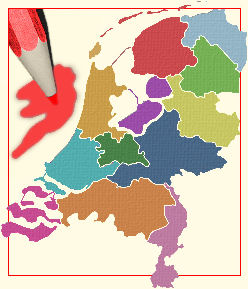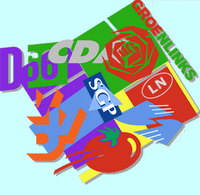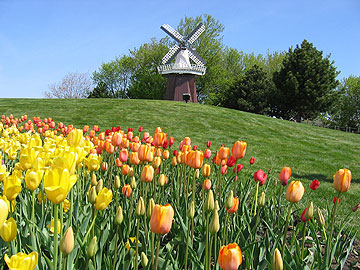I am going to talk about a very important event in the Netherlands. Yesterday Dutch went to  voting posts to elect new representatives for them in the parliament. The winner of 2003 elections, the right Christian Democrats (CDA) remained ahead, but lost majority of seats to the left Labour Party (PVdA) and Socialists Party (SP), who is now considered as the big winners. This means that the new government must deal with a new dilemma: a new political structure in a government never seen before in a democratic country. This is very difficult, and as some analysis said on the radio while I am on way to work “this has never happened before in the history of this country” and some in advance indicated that “the process of forming a government will be a lengthy one, and might lead to another elections in summer of 2007, at worst case”.
voting posts to elect new representatives for them in the parliament. The winner of 2003 elections, the right Christian Democrats (CDA) remained ahead, but lost majority of seats to the left Labour Party (PVdA) and Socialists Party (SP), who is now considered as the big winners. This means that the new government must deal with a new dilemma: a new political structure in a government never seen before in a democratic country. This is very difficult, and as some analysis said on the radio while I am on way to work “this has never happened before in the history of this country” and some in advance indicated that “the process of forming a government will be a lengthy one, and might lead to another elections in summer of 2007, at worst case”.
The question I asked myself is: What kind of message the common Dutch citizen tried to send?” There are a few ones: first message is a reward, the current prime minister, Jan Peter Balkenende (Christian Democrats) and his party will remain in power. In spite of all critics related to his policy in the past years (or even to his character) the voters decided to keep him in power, maybe because of his success in pulling the country out from the ground and making its economy flourish – The Netherlands now has the lowest unemployment rate in Europe. The second message is the main and most important one: The voters was very loud and clear by saying “we want more social Netherland” i.e. more towards the left, and as a result, the SP and the PvdA were the big winners!
Confusing, right?
Its worth mentioning that the socialist party is considered to be the party with the most extensive elections campaign compare it to all other political parties.
Some might say that this split could be a dangerous turning point f or the political scene in the Netherlands. I disagree. The elections of 22 November 2006 did not bring split among Dutch in the sense of the word. The elections were not about how people show support for a specific party (or person) based on their expectation for the coming 4 years, on the contrary, it showed the voters were making a sort of a judgment on the conduct all politicians in the Netherlands made in the past 4 years, and this is how the concept of reward and punishment came about. It is like saying to the Christian Democrats “ you can stay in power, but change in attitude is needed” A similar call to the left, especially to the Labour Party, when voters decided to remain left, but give more votes to the Socialist party – maybe because of the trend the Labour Party shift to the centre that caused such a change in heart by the voters!! , and that was the third message - the public keep an eye on its government! The fourth message by the Dutch voter was a sort of a punishment to other politicians and their political parties, such as the VVD (People's Party for Freedom and Democracy) and List Pim Fortuyn, both suffered the most.
or the political scene in the Netherlands. I disagree. The elections of 22 November 2006 did not bring split among Dutch in the sense of the word. The elections were not about how people show support for a specific party (or person) based on their expectation for the coming 4 years, on the contrary, it showed the voters were making a sort of a judgment on the conduct all politicians in the Netherlands made in the past 4 years, and this is how the concept of reward and punishment came about. It is like saying to the Christian Democrats “ you can stay in power, but change in attitude is needed” A similar call to the left, especially to the Labour Party, when voters decided to remain left, but give more votes to the Socialist party – maybe because of the trend the Labour Party shift to the centre that caused such a change in heart by the voters!! , and that was the third message - the public keep an eye on its government! The fourth message by the Dutch voter was a sort of a punishment to other politicians and their political parties, such as the VVD (People's Party for Freedom and Democracy) and List Pim Fortuyn, both suffered the most.
However, the right did not lose all ground to the left, and there is a fifth message from the voters to everyone: The emergance of a new extreme right within the political scene. This extreme right rised on the account of the VVD and LPF, and this is based on the fear factor, mainly related to Islam. Problems such as radical Islam, integration of Muslims in Dutch community (and other related issues) gave a chance to approximately half a million voters to look for a strong figure that would provide safe-haven for them and might represents an iron first that can smash the cause of such problems. Thus, the big surprise in this election was the PvdV (Partij van de Vrijheid) or Freedom Party, by gaining 9 seats in the perliament. This party is known for its extreme stand (or shall I say hatred) towards muslims living in the Netherlands. The party is led by Geert Wilders, from the southern town of Venlo, who is well known for his repeating rants about “less Islam” or “we want to stop the islamization of the Netherlands” after every three of four sentences he say in every speech.
Another big surprise in these elections was the Party for Animals! This is the first time in history of Europe (or the whole world?) that such a party gains seats in a parliament.
The elections this year was different from previous ones, because there was less focus on Immigration and illegal people coming to Holland. This year, the discussion and political campaign was focusing more on the welfare of the common citizen. Actually, believing in norms and values (among other factors) were the strongest behind people going voting. This was an advantage for the Christian Union party to gain more votes in these elections, in my opinion. However, the Christian Union party were quick to understood all the messages from the voters, because the moment the results started to come out, this party announced their desire to become a “Social-Christian” party - A term which has never been used or heard before within the political playing-field! Believing in norms and values also helped the Green Party to fairly stabilize his position; no wining, no loss – in spite of the loss of one seat! It is a fact that a coalition cannot be formed of the left i.e. SP, PvdA and Green Party, because they don’t have the majority, but their collective influence will be noticed effectively.
The political storm in the Netherlands is far from over. We will witness a very interesting, and extremely critical – if not the most critical chapter in Dutch politics ever.
A smart politician will keep this extraordinary balance alive, but how? The ruling party, the CDA must make compromises to remain effective and to be able to gain more popularity, is Prime Minister Balkenende prepared to do so, especially with his socialists and labour party rivals? In addition, the VVD need to  ajdust their policy in order to gain its stolen support back from Wilder’s Freedom Party, how? Especially that Wilders will play on the anti-Muslims string more than ever seeing that this already brought him more popularity and more votes. Geert Wilders will take any opportunity to raise his cause high, that’s for sure, and no one knows if he would succedd or not. One thing for sure that he won't rely on any of other politicians in the big parties. It was obvious from yesterday’s final debate after the announcement of the voting results, where the "big winners" sat together around one table discussing. It was obvious that Geert Wilders is not favored by most of most politicians sitting on the very same table. The left on the other hand will benefit from the results of the elections and some might think that playing hard by putting more pressure on the right will bring some political profit, but this is will result in great unstablity, and therefore more problems, not for the politicians, but to the common citizens, of all sorts.
ajdust their policy in order to gain its stolen support back from Wilder’s Freedom Party, how? Especially that Wilders will play on the anti-Muslims string more than ever seeing that this already brought him more popularity and more votes. Geert Wilders will take any opportunity to raise his cause high, that’s for sure, and no one knows if he would succedd or not. One thing for sure that he won't rely on any of other politicians in the big parties. It was obvious from yesterday’s final debate after the announcement of the voting results, where the "big winners" sat together around one table discussing. It was obvious that Geert Wilders is not favored by most of most politicians sitting on the very same table. The left on the other hand will benefit from the results of the elections and some might think that playing hard by putting more pressure on the right will bring some political profit, but this is will result in great unstablity, and therefore more problems, not for the politicians, but to the common citizens, of all sorts.
What the Netherlands is going through for the last four or five years is a very complex experience. Everyone knows that things will never be the same as they were in the 70s, 80s or the early 90s. There are now many colors standing behind orange in 21st century Holland. These colors will either push the country forward towards prosperity and beter welfare, or pull it down to another economic and social dark hole.
Within all this complexity, what would be the role of the immigrant who lived here for years, who has been granted the Dutch nationality, and given the opportunity to vote? What are the initiatives any immigrant might take for the sake of the country he lives in? this is another topic I wanted to write about very long time ago, but I will one day, hopefully soon.
The final conclusion I can draw from this very difficult and interesting elections is that Dutch should be proud of their democracy, because democracy in the low lands is healthier than ever, healthier than in any other country on the planet.
Thursday, November 23, 2006
Elections in the Netherlands: The Peak of Democracy
Posted by
MixMax
at
12:41 PM
![]()
Labels: Netherlands, Politics
Subscribe to:
Post Comments (Atom)



No comments:
Post a Comment